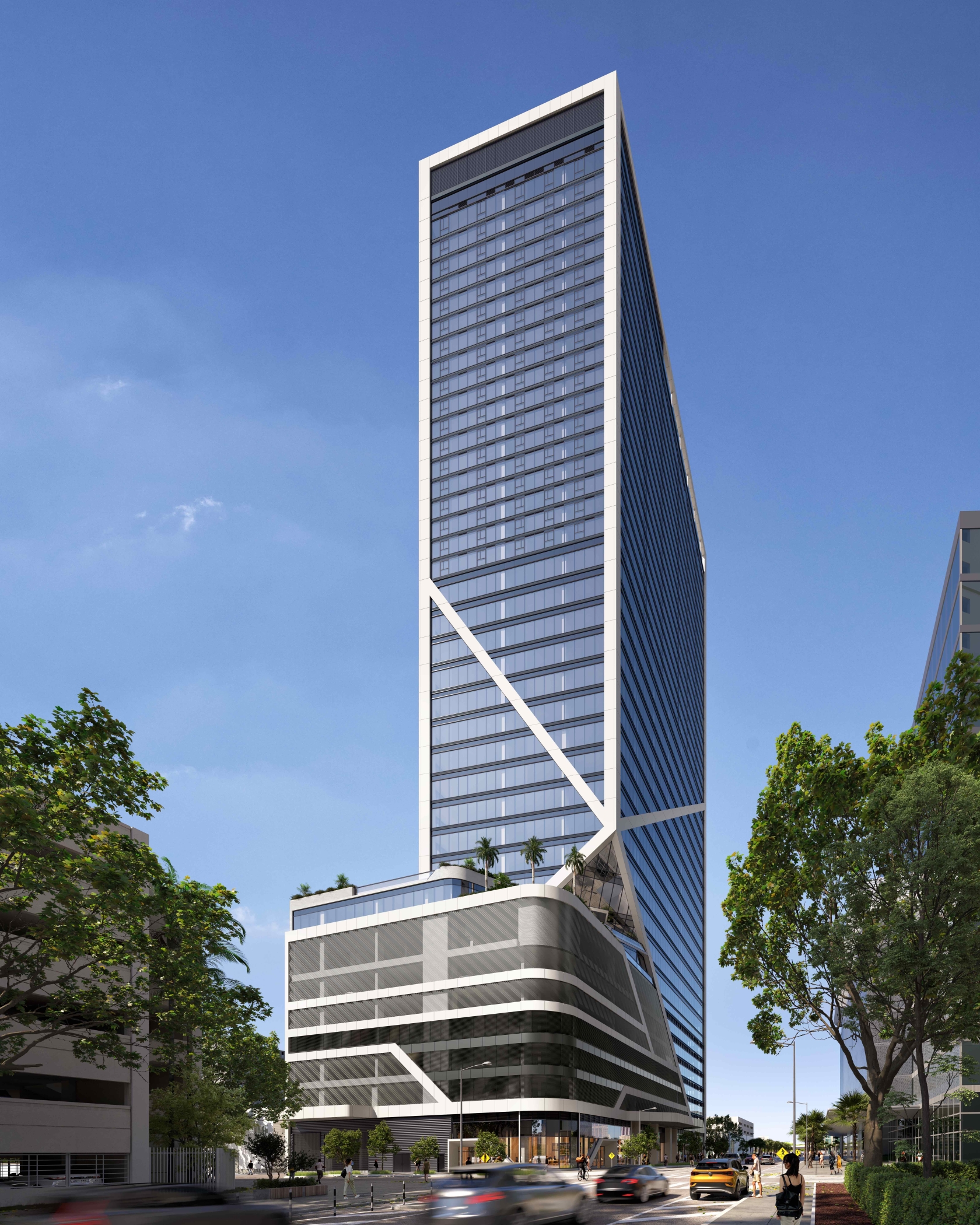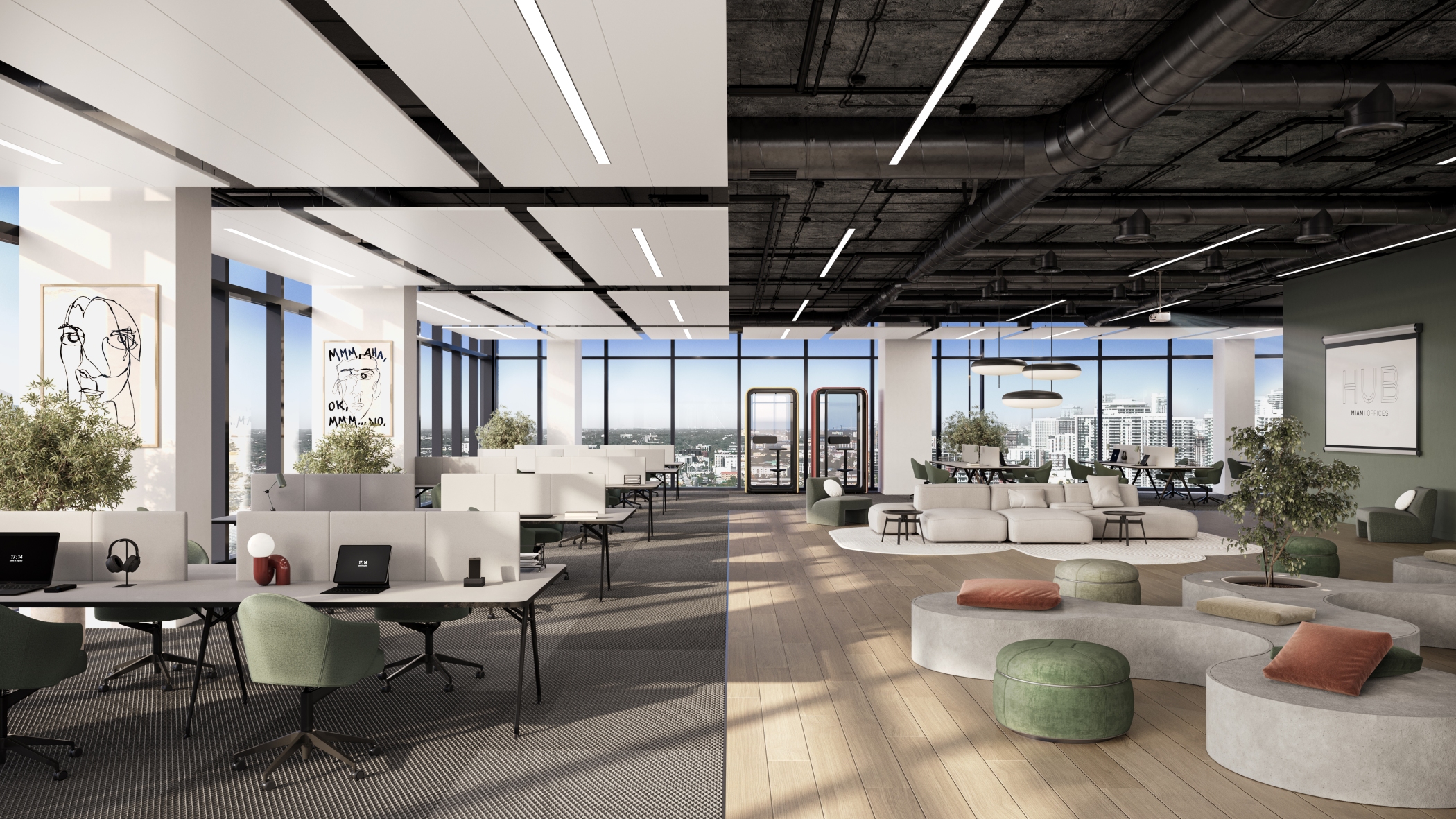The John Buck Co. is coming to South Florida, joining other out-of-state developers looking to build high-end towers near downtown Miami that combine top-tier office space with luxury condominiums all under one roof.
Hub Miami is the first project in South Florida from the developer that takes its name from founder John A. Buck, who serves as the company's CEO and chairman. The John Buck Co. has developed 45 million square feet of office and mixed-use space across the country since it was founded about four decades ago, including trophy office towers along Chicago's Wacker Drive and Loop business districts.
After years of watching South Florida's growth from the sidelines, John Buck Co. decided to make its move because of the region's evolution from “what was historically a boom-and-bust market tied to leisure and tourism to one with more of a sustainable foundation," Ryan Lovell, the company's managing director of investments, told CoStar News. Now, he added, “everybody’s in Miami.”
Over the past three years, 108 companies committed to expand or relocate to the Miami area, according to Miami-Dade County’s economic development arm. That list includes major financial institutions and hedge funds such as Citadel and Goldman Sachs as well as tech giants like Microsoft and Apple.
That corporate influx has steadily driven up office rents in Downtown, Brickell, Wynwood and Miami Beach. New-to-market and existing tenants are seeking trophy office space as part of flight-to-quality trends in those areas at a time of persistent demand, according to JLL's first-quarter office report.
The demand led John Buck Co., alongside locally based private equity firm Pebb Enterprises, real estate investment firm BH Group and developer Florida Value Partners, to propose Hub Miami. Plans for the 41-story mixed-use tower include 245,000 square feet of top-tier office space and 306 luxury condominiums located at 525 NW 2nd Ave. The location sits on the eastern edge of Miami's historic Overtown, and is “one of a handful” of towers offering both office and residential space, said Gus Alfonso, managing partner of Florida Value Partners.

Combining an office tower with residential units starting on the 22nd floor was driven equally by convenience and economics, Lovell said. Legally, the area already had been cleared for potential office space in the wake of a failed tower, and local officials have been clearing red tape for developers to build transit-oriented and mixed-use projects since the pandemic began.
Tracking Demand
The development team is also keeping track of what the market can handle, and with 1.2 million square feet of office leases set to expire between 2027 and 2029, there's a lot of potential demand in the pipeline, Lovell said. "We felt pretty confident at 250,000 square feet ... we can fill that building,” Lovell added.
In fact, Miami is lacking the high-quality office space between 80,000 and 200,000 square feet that companies relocating from New York, Chicago and California are looking for, Alfonso said.
“There's no space for large users,” Alfonso continued. That's where Hub Miami enters the picture. “We're sitting in a good position to be able to provide that. We're big-whale hunting,” he said.

Hub Miami joins a small group of proposed and under-construction towers that are combining offices with residential units within the same building. A similar project in Miami’s nascent Edgewater neighborhood at 2600 Biscayne from Oak Row Equities broke ground in April, while PMG has proposed 120 Brickell in the city’s financial district offering a 2-for-1 deal. Buyers there will receive a fully furnished and deeded office suite with their purchase of a residential unit.
Combined office and residential towers come with their own unique set of considerations, Alfonso explained. The mixed uses mean separate entrances and amenities for residents and office workers, increasing development costs. Meanwhile, the sale of condo units helps mitigate the need for additional financing. That means developers like John Buck Co. and its team can hedge their bets by selling the residences while negotiating leases with potential office tenants.
Alfonso told CoStar News that 48% of Hub Miami's 306 residences have been reserved, and he expects to hit the 50% threshold soon. The tower's office space is attracting "incredible demand for large users," and the developer is negotiating with several potential anchor tenants that were having trouble finding a large block of office space, said Alfonso, who declined to disclose the potential tenants.
Construction financing for the tower has yet to be secured as demolition of the old office tower shell is underway. A groundbreaking is expected around the end of the year, with an estimated completion sometime in 2027, according to BH Group's website.
Offices and Condos
Offices at Hub Miami begin on the ninth floor. Floor plates range from 18,000 square feet to 32,000 square feet, equipped with floor-to-ceiling windows and open areas without support columns. There is 15,000 square feet of amenity space planned, including a fitness center, tenant lounge, conference center, around-the-clock security and on-site concierge services.
Plans for the condo portion include fully furnished studios, one- and two-bedroom units ranging from 394 square feet to 1,046 square feet. The tower comes without rental restrictions, meaning residents will be able to rent out their units on Airbnb or similar platforms. Prices begin in the mid-$400,000s, according to an earlier statement from the developers.
Residential amenities include a fitness center, yoga and spin room, spa and sauna, lounge, work-from-home lounge equipped with private booths and conference spaces, an outdoor bar and lounge, as well as a resort-style pool and concierge services.
Right now, the four-story shell of an incomplete tower sits on the site where Hub Miami is planned. It’s all that remains of what was expected to be a 30-story office building abandoned by developers as the Great Recession rocked Miami's real estate scene.

The site marked an opportunity for John Buck Co. to enter the market in what has since turned into a prime location in the city center. The project is set to rise in Overtown, a neighborhood that has transformed during the past decade. Today, the incomplete tower is surrounded by Brightline’s MiamiCentral station, and just east of the tracks sits the $6 billion, 27-acre Miami Worldcenter.
The shift in the neighborhood is emblematic of the growth Miami has experienced and the new caliber of development happening throughout the region, Alfonso said. Over the past 15 years, Miami-Dade County's budget has grown from about $6 billion to more than $11 billion today. During that time, Alfonso said, the Miami ecosystem expanded to offer something for everyone from sports to museums and restaurants, and the area has cemented its position as a global financial hub.
That wasn't always the case. Prior to 2020, South Florida faced an uphill battle trying to lure companies to the area, in part, because of its lack of a citywide public transit network, its high housing costs and its yearly hurricane season. Amazon famously passed on the city in its search for an East Coast headquarters. Miami "lost a lot of business to Atlanta, New York and New Jersey," Alfonso said, adding, "I think we are no longer going to lose that competition.”
For the Record
CBRE is handling office leasing at Hub Miami, while OneWorld Properties is in charge of residential sales.
